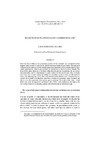Identificador persistente para citar o vincular este elemento:
https://accedacris.ulpgc.es/jspui/handle/10553/42797
| Título: | Teaching punctuation in early modern England | Autores/as: | RodríGuez-áLvarez, Alicia | Clasificación UNESCO: | 57 Lingüística | Palabras clave: | English Grammars punctuation punctuation marks |
Fecha de publicación: | 2010 | Editor/a: | 0081-6272 | Publicación seriada: | Studia Anglica Posnaniensia | Resumen: | Much has been written on the punctuation practice of late sixteenth- and seventeenth-century English writers in order to work out the ultimate function of marks of punctuation. The main point of discussion has almost ever been whether punctuation indicated syntactic relationships or represented speech pauses either to give emphasis in oral delivery or just to be able to breathe. The focus of this paper, however, is the theory rather than the practice, in particular, the set of rules and conventions used by schoolmasters to guide students in their use of stops. Thus, textbooks used at the time to teach reading and writing will constitute our main sources of information to achieve the following aims: (i) to offer a classification of the different marks of punctuation described, (ii) to establish the functions schoolbooks assigned to punctuation marks in general, and (iii) to assess the importance schoolmasters gave to pointing. The results of this study – which follows the works by Ong (1944) and Salmon (1962, 1988) – will contribute to shed light on the ever-lasting debate on the principles guiding Early Modern English punctuation usage. | URI: | https://accedacris.ulpgc.es/handle/10553/42797 | ISSN: | 0081-6272 | DOI: | 10.2478/v10121-009-0027-0 | Fuente: | Studia Anglica Posnaniensia[ISSN 0081-6272],v. 46, p. 35-49 |
| Colección: | Artículos |
Citas SCOPUSTM
6
actualizado el 08-jun-2025
Visitas
84
actualizado el 10-ene-2026
Descargas
81
actualizado el 10-ene-2026
Google ScholarTM
Verifica
Altmetric
Comparte
Exporta metadatos
Los elementos en ULPGC accedaCRIS están protegidos por derechos de autor con todos los derechos reservados, a menos que se indique lo contrario.
